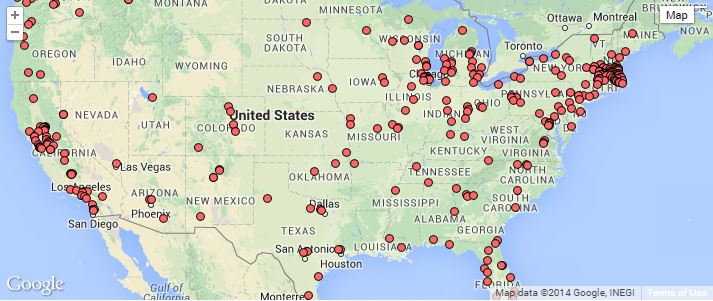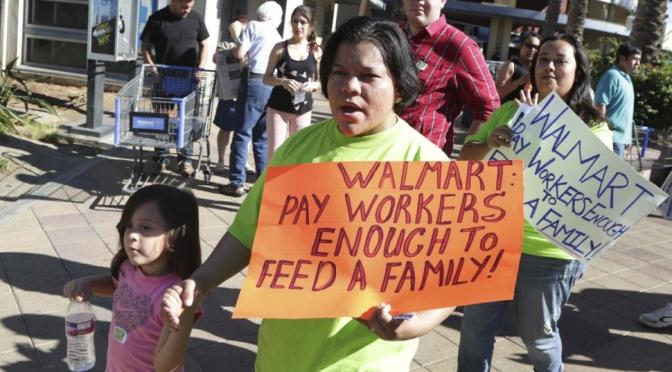PHOTO: JONATHAN ALCORN/REUTERS
This year, Black Friday sales dropped 11% nationally. While we can’t pinpoint the exact reason why this happened, two very significant events occurred on this shopping day, which contributed to the decrease.

First, thousands of workers across the U.S. faced off against Walmart on Black Friday. The Black Friday Protests were orchestrated by workers and the United Food & Commercial Workers International. They demanded to raise the minimum wage to $15 an hour, and follow the legislative precedent set in Seattle, which allows for a $15 minimum wage for residents beginning April 2015. Walmart has been the subject of scrutiny for more than a decade due to notoriously exploiting its part-time workers by denying them full-time hours, prohibiting union formation, paying low wages, and disqualifying their workers for healthcare benefits and overtime pay. Marketplace has put together a quick video of what it would mean to workers and the average tax-paying American for Walmart to supply a living wage:
Earlier this week, public outrage ensued when it was discovered several Walmart locations were sponsoring charity food drives for their own low-paid employees. While helpful to those associates, and not to minimize the good will one must have for his or her fellow workers, the situation’s only respite was its incredible irony. Walmart workers responded by returning the donation food bin to the Walton’s $25 million NYC condo on Park Avenue with the message ” We don’t want charity. We want decent pay. Love, Walmart Workers”
BREAKING: #WalmartStrikers return food bin to Alice Walton’s Park Ave. condo, saying they want a raise, not charity. pic.twitter.com/3b0lCgj7o3
— The Other 98% (@other98) November 24, 2014
What’s really interesting is the actual cost of a Walmart to the U.S. taxpayer. As Jess Guh writes for Counterpunch so well, that I will just copy and paste it here:
Walmart’s wages are so low that many of their employees require public assistance such as food stamps. The report calculated that a single “Walmart Supercenter” cost taxpayers anywhere from $904,542 to nearly $1.75 million dollars a year in taxpayer subsidies for employees. Another study estimated that that total annual cost to tax payers nationally was a staggering $6.2 billion dollars. And the kicker? Eighteen percent of the food stamp distributions are spent at Wal-Mart stores; that means that taxpayers essentially subsidized the $16 billion dollars in profits that Walmart made last year twice—once to subsidize wages, and once to subsidize the shoppers buying company products on sale in the stores.
Incredible, eh!? The push for national organizing campaigns for a living wage comes from two noticeable organizations across sectors: Raise the Living Wage Campaign (via the National Employment Law Project) and the StrikeFastFood campaign (which is working through an organizing group of the SEIU.)
Second, as a result of thousands enraged by the non-indictment of Darren Wilson for the death of Mike Brown, community leaders and activists called to boycott Black Friday. Malls and department stores were met with peaceful protests to demand justice for Michael Brown across the country, even as what could be described as a flash mob protest through the aisles of NYC’s Macy’s. As a protester said, “If Black lives don’t matter, then Black Friday shouldn’t matter.”
…He’s right.
Overall, what a productive holiday for working class communities to demand more and to create such impact with dignity.
